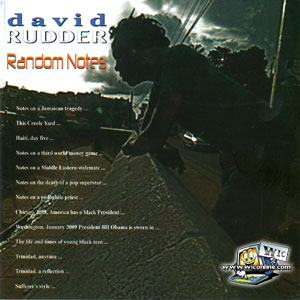Reviews July 8, 2011
Random Notes
Legend has it that as Philosopher-Poet Lao Tzu was leaving the Royal City after the kingdom he served had fallen into decadence, a city guard requested that he sit and write out a record of his wisdom before heading into exile. It may be a quirky comparison but David Rudder’s Random Notes is truly a legacy recording from a similarly large mind.
This album is beautifully produced, very controlled and symmetrical in its use of the many aspects of Rudder’s approach to lyrics and sound. The title Random Notes would be completely ironic if not for the author’s eclectic choice of topics, each giving vent to a fully developed Pan-American/ Pan-African consciousness that keeps finding new ways to reconcile Soul, Gospel, Calypso, MPB, Pop and Blues, carrying the listener’s imagination to the realities and current events of Jamaica, the USA, his native Trinidad and Tobago and, in particular, the mountainous land of Haiti.
In an album dedicated to Caribbean columnist and poet Wayne Brown, Rudder takes to heart the journalistic vocation of the Calypsonian. As McLuhan would appreciate, Rudder’s medium, the album, carries its own message, so much so that a short journey through the structure of the work is necessary.
The growling basslines, sliding brass and uneasy cuica-like trills ring as Rudder welcomes us to JamRock, with his own ironic take on political intrigue, drugs and violence. Weaving his lines around the recent extradition drama of Christopher “Dudus” Coke, he leaves us with the jewel phrase “they [Americans] produced their master card….They take back their visa”. From Jamaica, Rudder returns to his classic “Haiti” with a reflection on the January 12 tragedy: “Haiti, Day One”. With its smoothed-out choral sound, the song at first does not quite seem up to the standard of its predecessor, but as good ballads tend to do, it creeps up and remains with the listener, somewhat like Hendrix’ “The Wind Cries Mary”.
Rudder remains in Haiti for the next two tracks, first to deliver the story of Jean Philippe’s love, loss and dignity in the midst of tragedy in “No Honour For the Dead”, and then to produce a critique of the outpouring of emotion towards the island of Toussaint L’Ouverture in “Men on the Hill”. Here, he argues sweetly that “all goodwill, will come to nothing”, and even descends into prose to drive home his point: “please let the bread reach, the children on the ground”.
Children also enter the next track, “Walls”, this time as backing vocalists to a gospel/pop-inflected ballad on the Israel-Palestine divide. Musing on whether “a cold wall in a historied heart [can] ever crumble”, the track’s feel is reminiscent of similarly themed music by Michael Jackson, the artiste Rudder then proceeds to honour with “ManJack”. Rudder chants: “He was bad, his life it was a thriller…the stuff he did was off the wall”, giving us perspective on the death, not only of an artiste but a piece of music history itself. ManJack’s discordant piano accompaniment reminds one somehow of Ol’ Dirty Bastard’s “(Jesus, I’m) Rollin’ wit’ you”, a track that itself contains a reference to MJ and also deals with the issue of “this beast we call “The Biz””.
Coincidences aside, it is certainly not unintentional that Rudder launches next into the issue of child molestation. Latinate incantation signals the beginning of “Father Murphy’s Room”, a composition that Rudder fittingly laces with a Celtic ambient background that isolates and shows off his soul-calypso storytelling style.
Combining the seriousness of his topics with a calmingly full rhythmic background and infectious airy breakdowns, Rudder skillfully avoids overwhelming the listener. He now lets us off the hook with two upbeat R&B/Gospel-flavoured tracks: “One Fine Morning” (a duo with the enigmatic voice of Roger George and the only track he did not write himself) and “Party on the Mall”, both celebrating the Obama Presidency in a manner that is joyous yet relatively free of cliché. These two tracks also show up the excellent technical work done in producing the album and balancing its many elements and influences.
This respite does not last long though, and Rudder sobers up with “25”, a reflection on youth violence pierced by hard drum licks, telling us that a “Glock is ticking” as young men end lives that are just beginning. A reminder of Stevie Wonder’s “Heaven Help Us All”, this priestly astonishment at the madness of it all continues as Rudder returns to his native Trinidad, delivering his address to the “Drama Island” in a style reminiscent of his innovative “Zero” and “The Brand New Lucky Diamond Horseshoe Club” albums. Brass-lines come forward to underline the disorderly franticness of this “Magical land, out of control” as he calls on his native land to stop freefalling with a watery lament that betrays a reluctant and almost tearful farewell.
As any critical journalist would, Rudder does not provide a neat or happy ending, even as he returns in the final track, “Sufferer’s style”, to the theme of “Coke”, completing the symmetry of the work. As he laughs ironically in mentioning President Obama, one wonders what it really means for the Caribbean after all to have a ‘Black man in the White House’. His last notes provide a song for the downtrodden, abandoning moral lessons in favour of open doors, perhaps to self-knowledge through word and sound. In the space of 62 flowing minutes, David Rudder has said his piece and is gone, leaving us a legacy of choices.
-Chanzo Greenidge









